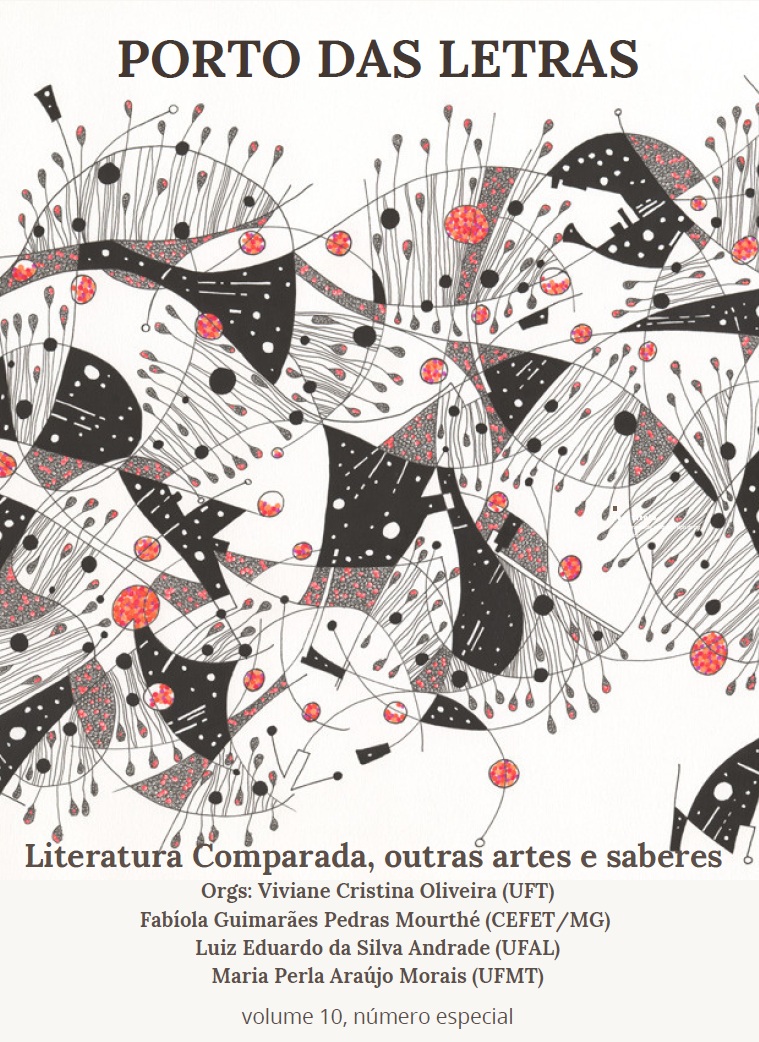DEVIR E DESEJO EM VIDAS SECAS
DOI:
https://doi.org/10.20873.24e18Abstract
this article seeks to demonstrate, from the analysis of the novel Vidas secas, by Graciliano Ramos and from the consideration of its critical fortune, that the cowboy Fabiano and his family, the main characters of the work, manifest a becoming-animal and link themselves to what philosophers Gilles Deleuze and Felix Guattari denominate “idealistic conception of desire”. Following most of the criticism, we agree that these traits keep the characters passively submitted to the environment’s natural and social oppression, from which they only can leave by evasion. Nonetheless, we also argue (against the hegemonical position of criticism) for the existence of positive aspects in the becoming-animal of the characters, which allows them to resist the inhospitable environment of the Caatinga and, thus, create new forms of existence. In turn, this also assumes another relationship with desire, which is not only one of evasion, but of intervention on reality, which mobilize the characters out of the Caatinga’s environment.
References
BOSI, Alfredo. Céu, inferno. In: ______. Céu, inferno: ensaios de crítica literária e ideológica. 2. ed. São Paulo: Duas Cidades; 34, 2003.
BUENO, Luis. Uma história do romance de 30. São Paulo: Edusp; Campinas: Unicamp, 2006.
CANDIDO, Antonio. Ficção e confissão: ensaios sobre Graciliano Ramos. 3. ed. Rio de Janeiro: Ouro sobre azul, 2006.
COUTINHO, Carlos Nelson. Graciliano Ramos. In: BRAYNER, Sonia (org.). Graciliano Ramos. 2. ed. Rio de Janeiro: Civilização Brasileira, 1978.
DELEUZE, Gilles. A literatura e a vida. In: ________. Crítica e clínica. São Paulo: 34, 1997.
DELEUZE, Gilles; GUATTARI, Félix. O anti-Édipo: capitalismo e esquizofrenia 1. Tradução de Luiz B. L. Orlandi. São Paulo: 34, 2010.
_____. Mil platôs: capitalismo e esquizofrenia 2. Tradução de Ana Lúcia de Oliveira, Aurélio Guerra Neto e Célia Pinto Costa. Rio de Janeiro: 34, 1995, vol. 1.
_____. Mil platôs: capitalismo e esquizofrenia 2. Tradução de Aurélio Guerra Neto et al. Rio de Janeiro: 34, 1996, vol. 3.
HOLANDA, Lourival. Sob o signo do silêncio: Vidas secas e O estrangeiro. São Paulo: Edusp, 1992.
MIRANDA, Wander Melo. Graciliano Ramos. São Paulo: Publifolha, 2004.
RAMOS, Graciliano. Vidas secas. 102. ed. Rio de Janeiro: Record, 2007.
RAMOS, Málter Dias. O silêncio em Vidas Secas. In: FERNANDES, Cleudemar Alves; GAMA-KHALIL, Marisa Martins; ALVES JUNIOR, José Antônio (orgs.). Análise do discurso na literatura: rios turvos de margens indefinidas. São Paulo: Claraluz, 2009.
SANDRINI, Elizabete Gerlânia Caron; SOARES, Luis Eustáquio. O pensamento rizomático de Fabiano do romance Vidas secas, de Graciliano Ramos. Contexto: revista do Programa de Pós-graduação em Letras. Vitória, n. 27, pp. 445-464, 2015.
SANT’ANNA, Affonso Romano de. Análise estrutural de romances brasileiros. 7. ed. São Paulo: Ática, 1990.
ZOURABICHVILI, François. O vocabulário de Deleuze. Rio de Janeiro: Relume Dumará, 2004.
Downloads
Published
How to Cite
Issue
Section
License
Os autores concordam com os termos da Declaração de Direito Autoral, que se aplicará a esta submissão caso seja publicada nesta revista (comentários ao editor podem ser incluídos a seguir).




